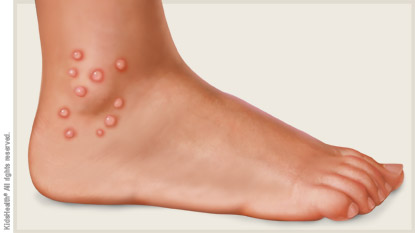Chigger Bites
Overview
What Are Chiggers?
Chiggers (also called harvest mites or red bugs) are tiny red mites that bite. Their bites aren't painful, but they do cause intense itching.
Chiggers are members of the arachnid family, which also includes spiders and ticks. Chiggers are smaller than a period at the end of a sentence. In fact, you need a magnifying glass to see most of them.
Where Do They Live?
Chiggers are found all over the outdoors, like in grassy fields, along lakes and streams, and in forests. It's the baby chiggers that bite people and animals.
In the United States, chigger bites happen most often in late spring, summer, and early fall. Chiggers tend to come out when the ground is warm. They can’t live when the weather turns cold.
Top Things to Know
- Chiggers are tiny red bugs that can bite and cause itchy bumps.
- The bites usually show up in groups on the waist or ankles, or in skin folds.
- Soap and water, cool cloths, and anti-itch creams can help treat chigger bites.
- Wearing long sleeves and pants, and using bug spray can help prevent the bites.
Signs & Symptoms
What Do Chigger Bites Look and Feel Like?
Chigger bites are itchy bumps that are usually red and may look like pimples, blisters, or small hives. You usually find them around the waist or ankles, or in warm skin folds. The bites get bigger and itchier over several days, and often appear in groups.

Chigger bites start to itch within hours of the chigger attaching to the skin. The itch stops after a few days, and the red bumps heal over 1–2 weeks.
If chigger bites happen on the penis, they can cause swelling, itching, and painful peeing. This is known as "summer penile syndrome."
When Should I Call the Doctor?
Call your doctor if:
- Over-the-counter creams or lotions don't help the itching.
- A bite looks infected (watch for warmth, redness around the bite, swelling, tenderness, or pus).
- Your child has symptoms of summer penile syndrome.
Causes & Prevention
How Do Chigger Bites Happen?
After hatching, baby chiggers wait on plants for people or animals to pass by. When they do, the chigger attaches to them using tiny claws. Once attached, it pierces their skin and injects its saliva (spit). The spit contains digestive juices that dissolve skin cells. The chigger then eats the dissolved cells, which provide the protein it needs to grow into an adult. After a couple of days the chigger falls off, leaving a red bump on the skin.
Are They Contagious?
Chigger bites aren't contagious, so kids can't catch them from someone or give them to somebody else. Your child can still play sports and do all normal activities unless the itching is too uncomfortable.
Can They Be Prevented?
To help prevent chigger bites when outdoors:
- Apply an insect repellentwith 10%–30% DEET to exposed skin and clothes. You can also treat clothing with a specific insecticide (like permethrin) to help prevent bites.
- Wear long-sleeved shirts and long pants tucked into shoes, especially during hiking. This also can help protect kids from other biting critters like ticks and mosquitoes.
- Wash kids' skin with soap and water when they come back inside. Also, wash all clothes in hot water and tumble dry on high heat before they're worn again.
Diagnosis
How Are Chigger Bites Diagnosed?
Doctors can diagnose chigger bites by looking at them and asking about any recent outdoor activities.
Treatment & Home Care
How Are Chigger Bites Treated?
Unlike mosquitoes and ticks, chiggers don't carry disease. So they’re not harmful, just annoying. You can usually treat chigger bites at home with these tips:
- Wash chigger bites well with soap and water to help remove any chiggers that are still attached to the skin.
- Hold a cool washcloth over the bites to soothe the area.
- Use calamine lotion or anti-itch creams to ease itching.
- Try giving an antihistamine (allergy medicine) by mouth to help with itching, especially if the bites keep your child up at night.
Risks of Scratching
It’s important to avoid scratching chigger bites, so keep your child’s fingernails short. Scratching can damage the skin and lead to:
- impetigo, a bacterial infection of the skin, with pus and crusts around the bites
- a larger area of increasing redness, swelling, pain, and warmth, called cellulitis
If a skin infection does happen, your child might need an antibiotic to treat it.
What Else Should I Know?
Sometimes it can be hard to tell if it’s a chigger bite or something else. Chigger bites may look like the bites from other tiny bugs, such as bedbugs and fleas. Mosquito bites are usually bigger than chigger bites and don’t tend to appear in a group. Chickenpox also causes itchy bumps, but those happen all over the body with other symptoms, like fever.
Always check with your doctor when your child has an unusual bump on the skin or rash.
